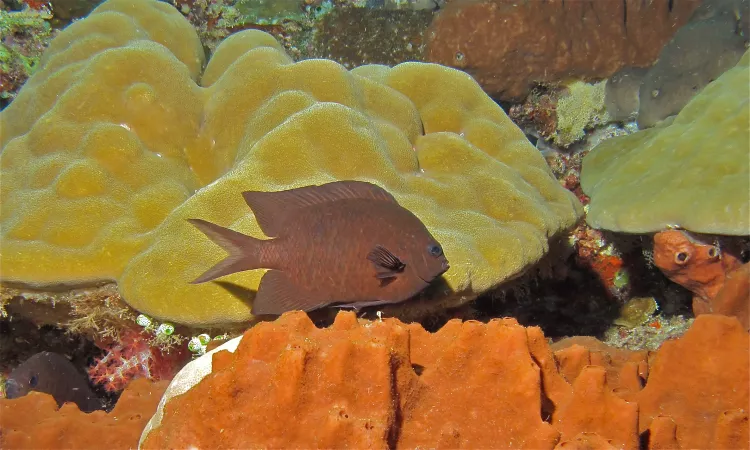Coral reef fish breed better with less motorboat noise
A new study by researchers at the universities of Exeter and Bristol showed that “traffic calming” boosts breeding of reef fishes. For a whole breeding season, scientists implemented traffic calming on three reefs, decreasing the number of boats within 100m and reducing their speed.
They then followed the breeding of spiny chromis and discovered that 65 percent of nests on quieter reefs still had offspring at the season’s end, compared to 40 percent on reefs with a lot of motorboat traffic. On quieter reefs, offspring were larger, and each nest had more offspring by the end of the season.
Some juvenile fish on coral reefs exposed to motorboat noise have stunted growth and may be half as likely to survive as fish on quieter reefs, owing to the noise pollution altering their parents' caregiving behavior, said the researchers.

Disrupting parenting behaviors of fishes
Noise interrupts the chromis’ essential parental behaviors, such as “fanning” eggs with their fins to guarantee oxygen flow, according to aquarium research on the same species. The study was conducted near Lizard Island Research Station on Australia’s Great Barrier Reef.
“With coral reefs worldwide facing multiple threats, the results of our experiment offer a way to help struggling populations,” said Dr Sophie Nedelec, lead author of the study. “Simply reducing boat noise at reefs provides fish with much-needed relief to allow successful reproduction.
“Moving boating channels farther away from reefs, driving slowly when approaching reefs, and avoiding anchoring next to reefs provide three simple changes that any boat driver can adopt.
“These solutions put the power in the hands of local people to protect vulnerable ecosystems." Nedelec added, “No one has attempted a field experiment like this before."

Aquarium study
In a separate aquarium study, a few spiny chromis parents and eggs had natural reef noises played to them on speakers, while others were subjected to occasional boat noise. The researchers found that fanning was interrupted by the boat noises but proceeded unabated with natural sounds.
“The complementary lab study demonstrated that these improvements to breeding really are due to limiting noise pollution, and not other kinds of disturbance from the boats,” said co-author Andy Radford.

Benefits of acoustic sanctuaries
Results from the two studies suggest that reducing boat noise could benefit reef fish populations, making reefs more resilient to change due to human activity or cyclones and bleaching, which are becoming increasingly common with climate change.
“While we try to tackle the biggest threat of climate change, we need simple solutions that reduce local threat, said senior author Professor Steve Simpson, from the University of Bristol. “Acoustic sanctuaries can build resilience on coral reefs and help give reefs more chance of recovery.”
The research, published in the journal Nature Communications, was funded by the Natural Environment Research Council.





























